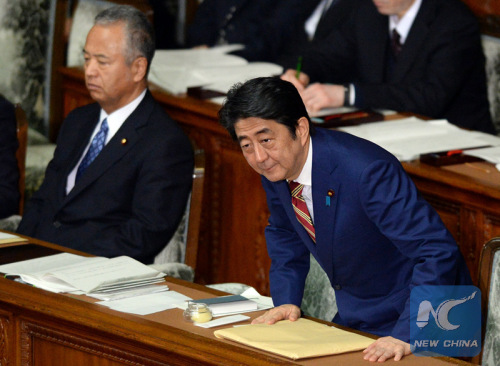
Japanese Prime Minister Shinzo Abe (R) attend a session of the House of Representatives in Tokyo, Japan, on Jan. 22, 2016. (Xinhua/Ma Ping)
Japan's plan to place the South China Sea at the top of the agenda at the upcoming meeting of the Group of Seven (G7) foreign ministers is a self-deprecating move only to show a regional wave-maker keen on rocking the boat. If unchecked, such a provocation would shift the focus of the meeting from more deserving concerns.
The agenda of the two-day gathering to be held on Sunday in Hiroshima and drafted by Japan is quite lackluster. Japanese Foreign Minister Fumio Kishida will meet with his six counterparts at the iconic Peace Memorial Park to emphasize how his country became the sole victim of the nuclear bombs. But more substantive part is that he has purportedly coordinated to outline a joint communique regarding the sovereignty disputes over the South China Sea, despite the fact that neither Japan nor any G7 member is a relevant party to the disputes.
His attempt may prove futile. The G7's influence in global affairs is already declining, and the Group of 20 (G20) is increasingly relevant. Embracing emerging economies including China, its appeal has been more in line with the common aspirations and consensus of a multipolar world.
But considering its much diminished voice in the G20 and frustrated efforts to become a veto-holding permanent member of the UN Security Council, it's no wonder Tokyo is desperate to promote its stance and concerns within the G7.
Long uncomfortable with China's rising influence in the region, Japanese Prime Minister Shinzo Abe and his administration have never passed up an opportunity to trip up and contain China. Behind their unwonted interests in accusing China of militarizing the South China Sea is Tokyo's real scheme to provoke the West into lashing out at China.
But this plot is untimely, as China's proposals of two-way talks and a peaceful compromise on the issue have been increasingly accepted by the parties involved. Even it is apparently not ready to quit making troubles on the South China Sea issue, Japan's preference for fear-mongering and wedge-driving between China and other regional players has made its outward presence as a promoter of peace in complete contradiction.
Even if the G7's communique does refer to the South China Sea issue, as it did once in the past, an explicit statement to intervene and denounce Beijing, which would please Tokyo, is highly unlikely. Expect the statement to be an ambiguously worded one.
After all, for the sake of their national interests, other G7 members should not be interested in seeing Japan hijack the agenda and themselves get involved in China's sovereignty issues, at the cost of their own lucrative cooperation and effective communication with China.
It is undoubtedly justifiable for G7 members to talk about any issues they care about. But the group's long-term credibility and influence in the international arena require them to take into consideration the standpoints of main forces outside the mechanism including China, and engage in constructive interactions with them, so as to make the group's discourse more representative and feasible.
As for Tokyo, it has long felt the pains of its relentless and wearisome provocations against China, such as icy bilateral exchange and seeing its influence decrease in the region's development strategy. It is high time for Japan's policymakers to show some foresight and take practical actions to enhance dialogue and cooperation with China, if they have any conscientious statesmanship.


















































